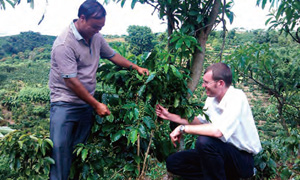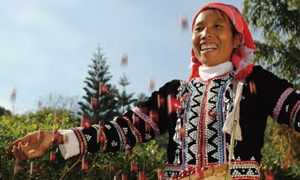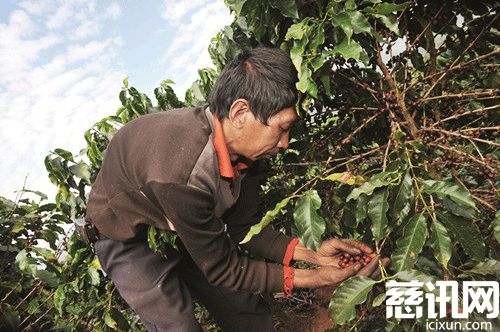Nestle Coffee Program (Development of Coffee Industry in Pu'er, Yunnan)
Case introduction
The purpose of Nestl é in helping Yunnan to develop coffee bean production is to ensure that the company can purchase high quality coffee beans for Nestle coffee production. Now, Nestl é has become a stable, reliable and fair buyer of Yunnan coffee beans, helping to achieve economic prosperity in Pu'er area of Yunnan Province.
Yunnan has an ideal climate for coffee cultivation. Nestl é has been committed to ensuring that coffee beans produced by farmers meet high-quality standards. In the process of achieving this goal, the technical assistance and training of Nestl é is the key factor for success. Nestl é not only teaches advanced and sustainable cultivation methods in this area, but also introduces new varieties of high-yielding small-grain coffee to the region. Thus it promotes the overall development of the coffee growing area of Pu'er City, Yunnan Province.
In 1992, Nestl é set up a coffee agronomic service department in Yunnan Province to support and guide local coffee development. At the same time, the company also opened a pilot demonstration farm with a total area of 60 hectares in Jinghong City, Banna.
Nestl é also produces coffee seeds suitable for local soil conditions and climate, and provides technical advice to curry farmers to improve the yield and quality of their coffee beans, benefiting more than 36500 farmers; since 1995, more than 16000 people have registered to participate in the company's training in field management, processing techniques and best agricultural practices.
Nestl é has tirelessly provided coffee farmers in Yunnan with advanced coffee planting knowledge and technology, which helps to improve the growth and competitiveness of the local coffee growing industry. The specific advantages that Nestle's pilot demonstration farm brings to the local area include:
Demonstrate a wide range of coffee planting techniques, especially in coffee yield and quality, prevention and control of soil erosion and environmental protection
2 selection of new coffee varieties (in cooperation with Nestl é French R & D Center) and evaluation of the effects of different processing methods on cup quality
3 to provide excellent seeds of coffee varieties to farmers
(4) carry out small-scale experiments on the practical problems encountered by farmers in coffee production management (such as pest control).
So far, Nestl é has sent six generations of foreign experts and a team of Chinese experts to work in Yunnan, among which foreign experts are: Baud, Hans Fessler, Wang Daofu, Yang Dimai, Hute, and Kong Zanlong. Mr. Gihute of Belgium is the son of the fourth generation expert Yang Dimai, who has worked in Yunnan for nearly 10 years after his father's career. In a signed article published in the local Evening News during a visit to Belgium in 2014, President Xi Jinping mentioned Hute's story of helping coffee farmers get rich in Yunnan, which is a typical example of strengthening the friendship between the Chinese and Belgian people.
Nestle Coffee Project
In 2010, Nestle launched the Nestle Coffee Initiative, a global initiative aimed at creating value for all stakeholders in the coffee supply chain, from farmers to consumers to Nestle. The plan includes a series of goals to optimize Nestl é's coffee supply chain. In addition to the 200 million Swiss francs invested in the past decade, Nestl é will invest another 500 million Swiss francs in its coffee project by 2020.
As part of the Nestle Coffee Program, Nestl é will double the number of coffee beans Nestl é purchased directly from Cannon and its associations for the production of Nestle Coffee. With the support of the Rainforest Alliance (Rainforest Alliance) and 4C Association (Common Code for the Coffee Community, the general rule for the management of coffee communities), all Nestl é raw coffee beans purchased directly from Cajun have met the internationally recognized 4C sustainability standards. In addition, by 2020, 90000 tons of coffee beans for Nestle coffee production will be procured in accordance with the principles of the Rainforest Alliance and the Sustainable Agriculture Network (SAN).
In January 2013, Nestl é Pu'er Coffee Purchasing Station was certified by international 4C organization and became a 4C unit. The first 46 coffee suppliers who were trained and registered by Nestle Pu'er Coffee Purchasing Station also obtained the supply qualification in the 4C supply chain. So far, 6 batches of 2894 partners have passed 4C certification, benefiting more than 36500 farmers, covering nearly 200000 mu of acreage. 100% of the coffee beans purchased by Nestl é in Yunnan are 4C certified.
Nestle Coffee China Plan wins Global recognition
In June 2012, Nestl é's coffee growing work in Yunnan won the Global Business and Development Award on the eve of the United Nations Summit on Sustainable Development held in Rio de Janeiro, Brazil, which was sponsored by organizations such as the United Nations Development Programme (UNDP). The aim is to promote business activities that play a positive role in the development of their communities. In the same year, Nestl é also won the Best practice Award for Social Development at the first annual meeting of the China Network of the United Nations Global Compact.

Nestle Coffee Program teaches Coffee growing skills

Nestle Coffee Project guides Pu'er Ka Nong

Nestle Coffee Program planting training Center Laboratory

Nestle Coffee Project

Nestle Coffee Project
Important Notice :
前街咖啡 FrontStreet Coffee has moved to new addredd:
FrontStreet Coffee Address: 315,Donghua East Road,GuangZhou
Tel:020 38364473
- Prev

There are stories like Starbucks Yunnan
Speaking of Yunnan flavor, what do you think of? Fresh flower cakes and wild mushrooms are fresh given by nature; cloud legs and Pu 'er tea are alcohol brewed by time; as for sour horns and plums, these acids that hit the taste buds can defeat almost all the weak in the world. Now, blend these flavors together and you've got the essence of Starbucks Yunnan beans: light acidity, herbal flavor, richness
- Next

[charm Yunnan World sharing] "the World's Best Coffee" Yunnan Hougu released "military expansion"
On February 23, Hougu, a local coffee company highly respected by Foreign Minister Wang Yi, announced plans to expand its army in Kunming: in 2017, Hougu will recruit 1500 sales elites across the country and set up Hougu Coffee sales Company in major cities across the country. cooperate with local channels to formally enter the national coffee consumption market Yunnan output accounts for 95% of the country's coffee consumption ushered in a blowout.
Related
- What grade does Jamaica Blue Mountain No. 1 coffee belong to and how to drink it better? What is the highest grade of Blue Mountain coffee for coffee aristocrats?
- What are the flavor characteristics of the world-famous coffee Blue Mountain No. 1 Golden Mantelin? What are the characteristics of deep-roasted bitter coffee?
- Can I make coffee a second time in an Italian hand-brewed mocha pot? Why can't coffee be brewed several times like tea leaves?
- Hand-brewed coffee flows with a knife and a tornado. How to brew it? What is the proportion of grinding water and water temperature divided into?
- What is the difference between Indonesian Sumatra Mantinin coffee and gold Mantinin? How to distinguish between real and fake golden Mantelin coffee?
- What does bypass mean in coffee? Why can hand-brewed coffee and water make it better?
- Unexpected! Ruixing Telunsu lattes use a smoothie machine to foam milk?!
- % Arabia's first store in Henan opens into the village?! Netizen: Thought it was P's
- Does an authentic standard mocha coffee recipe use chocolate sauce or powder? Mocha Latte/Dirty Coffee/Salty Mocha Coffee Recipe Share!
- What is the difference between Vietnam egg coffee and Norway egg coffee? Hand-brewed single product coffee filter paper filter cloth filter flat solution!

